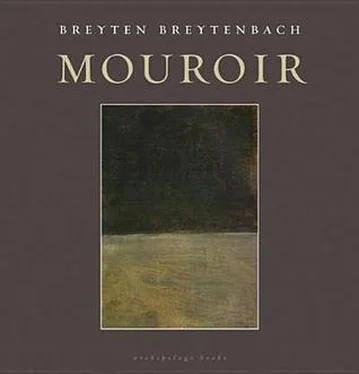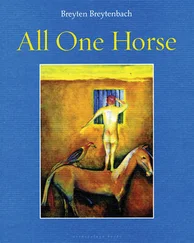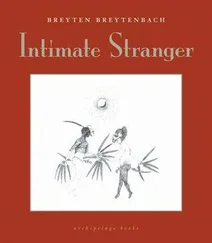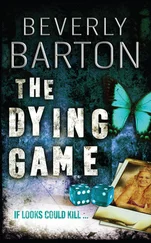Breyten Breytenbach - Mouroir
Здесь есть возможность читать онлайн «Breyten Breytenbach - Mouroir» весь текст электронной книги совершенно бесплатно (целиком полную версию без сокращений). В некоторых случаях можно слушать аудио, скачать через торрент в формате fb2 и присутствует краткое содержание. Год выпуска: 2009, Издательство: Archipelago Books, Жанр: Современная проза, на английском языке. Описание произведения, (предисловие) а так же отзывы посетителей доступны на портале библиотеки ЛибКат.
- Название:Mouroir
- Автор:
- Издательство:Archipelago Books
- Жанр:
- Год:2009
- ISBN:нет данных
- Рейтинг книги:3 / 5. Голосов: 1
-
Избранное:Добавить в избранное
- Отзывы:
-
Ваша оценка:
- 60
- 1
- 2
- 3
- 4
- 5
Mouroir: краткое содержание, описание и аннотация
Предлагаем к чтению аннотацию, описание, краткое содержание или предисловие (зависит от того, что написал сам автор книги «Mouroir»). Если вы не нашли необходимую информацию о книге — напишите в комментариях, мы постараемся отыскать её.
An outspoken human rights activist,
is a poet, novelist, memoirist, essayist, and visual artist. His paintings and drawings have been exhibited around the world. Born in South Africa, he immigrated to Paris in the late ’60s and became deeply involved in the anti-Apartheid movement. Breytenbach is the author of
, and
, among many others. He received the Alan Paton Award for
in 1994 and the prestigious Hertzog Prize for Poetry for
in 1999 and for
(
) in 2008.
Mouroir — читать онлайн бесплатно полную книгу (весь текст) целиком
Ниже представлен текст книги, разбитый по страницам. Система сохранения места последней прочитанной страницы, позволяет с удобством читать онлайн бесплатно книгу «Mouroir», без необходимости каждый раз заново искать на чём Вы остановились. Поставьте закладку, и сможете в любой момент перейти на страницу, на которой закончили чтение.
Интервал:
Закладка:
When it was already quite late I got up to go and smoke a cigar outside under the naked heavens. It was an old habit of mine to do so, even under otherwise normal circumstances: to slowly contemplate the fantastic pageant of the galaxy, all those beasts and formations and images and petrified ice fields and remote fluttering fires and to see how they rock by, to see how blanched they are; I know of no better solution for oppressive thoughts: the I is liquidated. The wind came from far away, noiseless, and encountered no resistance until it came pushing against the house with a soft, burbling sound. The wind smelled of unknown mosses and contused moulds, of crystals and of dust. The wind was also with a rustling in the loose leaves of the tree. The clatter was so muffled that one could presume, had you not known any better, that it wasn’t caused by the wind’s goings-on but perhaps by the slight and gradual fall-go of the stars overhead. It passed through my mind that the leaves will not be on the tree for much longer, that they will come loose as they’ve always done before and that the trunk and branches will be parched and grey, without sap of vegetative faculty. I also absorbed the notion that all come to nothing and fall away in this way, so, just like the grey ash of my cigar; and I furthermore thought of the white eyes in the bottomless abyss above my head, of the little clumps of bones, the white almond blossoms on invisible branches, the fluttering of pale wings. When I looked around me I was, alas, once again brought to the realization that our “yard” would never be transformed into a “garden”.
And all at once, under the rather deeper blackness of the leaves’ whispering, I became aware of something, or someone — of a presence, a barely noticeable change of position. I never moved an inch. From under the cover of dying or already dead leaves he stepped forward, laughing softly with shimmering teeth. Tjak. Or really — this too I immediately and intuitively sensed although he uttered not a word with reference to himself — actually not Tjak the way you and I would normally mean when talking about Tjak, or about Murphy or Giovanni or C — — or Glassface or Tuchverderber or Nefesh or Fremdkörper, but his. . what? His spirit? His memory? His momentary mirroring in the grey matter? His remains? The power field of words around him? Very close to me he came and softly he enquired whether he may finish off my cigar. I handed it to him, the smoke-flowing little grey stump notched by my fingernail at the one end, and deeply he sucked on it and for an instant the smoke lingered blueish grey between us before being carried away by the wind. When the cigar tip glowed clearer at short intervals, I could observe the large dark and wet stain on his chest: nearly as a shield protecting the body very intimately it was, or the ever-spreading blood puddle in the sand under the young doe giving birth whilst dying, or like a submerged rose it was of colour and to the touch — and it had an odd odour, the dank and yet distant smell of a wing. “Aber weisst du, ich habe mich damals so unauslegbar viel gefreut. . Wenn ich das unbedingt mal erklären könnte. . ” he still whispered nearly inaudibly soft with the wind among his words and starshine on his teeth, and then he was gone. Gone, irrevocably gone before my eyes. With my fingertips I stroked the paper sheet over this afternoon’s target and felt that it was sticky.
Many years went by. I don’t believe I ever again visited the house of grey planks and certainly it no longer exists, but became — as others before it? — one with the grey, the brownish and the purplish environment, just like the trees in exile and the exotic scorched flowering shrubs and little bushes one by one. Or does this house in reality still exist? I use the stirrup-word “reality” — knowing that it contains no conception — with aversion and reluctant lips. Is it not true, friend, that nothing finally gets lost in us? That the house, now that we discussed it, still lies somewhere in a huge grey landscape, a landscape alternatively becoming more sombre or brighter without shadows or boundaries being cast over it? I don’t believe I ever again penetrated the upland as deeply; steep-climbing gorges and canyons in the passes coiling higher along slopes where tons of gravel had come sliding down, at times cutting the route or burying it — but certainly no further. Occasionally I did visit the coast. The coastal strip itself, the fence running down into the sea was an area we were not allowed to enter. I knew — I no longer know how — that an ultra-modern camp had been constructed beyond that frontier on the slightly greenish hills and the yellow dunes, with the very best facilities: cinema halls, restaurants, drugstores, even a landing strip with a well-equipped control tower. Once I tried to explain it all to my mother. She was with me on holiday there — outside the fence — or she had come to visit me while I was holidaying there by myself, and we decided to go swimming. My mother was then already very old but her face and her body were fat and without wrinkles; with the hair tucked under a bathing cap and without her glasses she was quite white and blind. We watched a child — a little girl with red flames at the throat — playing in the water, and I tried to interpret to my mother the fugitive images on her retina. It was low tide, although stormy, and the girl clearly had the intention to obviate the barrier and to get, from the sea, to the enclosed zone. Despite the low tide the coast of that forbidden area was most dangerous with edged rocks, pools where the waves frothed, and a sea bottom descending rapidly and sharply. My mother was worried about the little girl and couldn’t understand why she insisted upon reaching that particularly treacherous beach; even from afar we saw the blood on her feet and legs, we noticed the water at her feet being coloured and foaming like a crocodile, and still she continued laughing with a shrill, hysterical voice while stubbornly attempting to reach the side. I explained to my mother that that camp, out of bounds to the little girl, was a veritable heaven on earth for children, and I described the wonderful luxuries to her in detail. But, when I wanted to point these out to her, there was nothing to be seen beyond the fence except for a few grey buildings, very low and smooth like bunkers just about entirely buried in the sand. Just seams; only bumps and reefs. I had to point out to my mother — though I was now blindly entering an unknown terrain — that the much vaunted wealth was probably installed in a subterranean way, yes, even the landing strip of the airfield. But that it had to be there, of that I was sure!
Along the coast the weather was continually fair. Above the blue space, below the sea blue or black at times, and like weathered gates maybe giving access to the deep land above and beyond were the brown sandcrests and hilltops along which the paths climbed; roads of an origin and a purpose and of the people using them — dealers? agents? recruiters? izigijima ? — fallen into oblivion. The sun in the hollows of the heavens was a silvered beetle at the hem of a sky-blue robe — but blue is just black seen from close up or grey seen from afar — or, you can express it this way too — the sun was the phosphorescent skeleton of a rider having to roam like an unsatiated and restless spirit through all times and all spaces even though the flesh has long since become blue dust. My heart wasn’t with the lips of sea and strand. Besides, on the side of the demarcation where people like me could move uninhibitedly, there was nothing — no asylum or hideaway or night club or public toilet or workshop or quay or church hall, no bus stop or road sign or cigar factory or drawings in the sand or birds’ nests. My heart stayed elsewhere, where it’s higher and clearer and more healthy, where the landscape is so insignificant that time’s passages could leave no mark and where time therefore does not exist, where there are no emotions or desires or memories to cling to. Perhaps my heart was only a sheet of paper with a number of holes, glued to the rough and by now nearly indistinguishable silhouette of a man traced as target on a metal plate. I couldn’t absorb my restlessness: there was a hole in my chest. The sun is at last a heart. Whenever I could I attempted ascending with one of the twisting and climbing paths, but never succeeded: so many of the passes were dead ends or had fallen in desuetude or had silted up or become eroded or were never intended to lead anywhere. On one such occasion — it was not yet noon and in my imagination I saw how the sky and the sun and even the stars, which by day also travel clothed in blue, become lost in the grey of the high plateaux somewhere above me until there would be just a soft shimmering over the earth, heaven and earth one imperishable because already gone — on one such an occasion when my imagination had like a bird flown up from my body to go and scout far ahead, I was obliged to stand off to one side, tightly pressed against a rock ledge to make way for a convoy approaching from ahead in orange-coloured dust clouds, on their way to the lowlands. There were a few camels heavily laden with grey baggage, a rider with expressionless eyes on a horse — maybe he was blind — and mostly donkeys with pack saddles, driven and accompanied by men with long headcloths wrapped around their heads and mouths and noses so that the light points of dust in their eyebrows were very evident. These men held, like lepers, small tinkling bells in their hands. I watched them coming by, and how they took no notice whatsoever of me, how they disappeared out of sight lower down around a bend of the pass. And I was on the point of continuing my journey, the dust raised by donkeys’ hooves had settled again, the sun was a vulture high up in the air and I considered that this caravan must definitely be coming from somewhere and that they therefore could indicate the route to the highland — or one of the routes — on condition that I remain on their tracks — but in spite of the dust the soil was hard and it was difficult to retrace the fresh marks on the rocky parts; there were too the millions of slits and small hollows and little riffs of old precedent tracks retained intact through the centuries, tracks forking off and disappearing in all directions so that one got the image, knowing it to be true, of a whole world consisting of layer upon layer of tracks — when I heard someone calling behind me. “Murphy! Murphy!” the one voice bawled, followed directly by a choir of further voices. What now? What could have happened? Were these the intonations and incantations of a midday prayer? But Murphy then? Or are they calling me? I turned around and ran back. A hundred yards from where I last lost sight of the caravan they were now motionless in the twelve o’clock heat. The beasts of burden were not unsaddled but just stood there, quiet, with lowered heads and the reins trailing in the dust; a camel or two stood ruminating with the funny cut-and-hash lip movements so peculiar to them. The drivers were all off to one side of the road, crowded around something on the ground there — here the area along the track was flat for a short distance. They no longer called out but rang their little bells with a sort of absent concentration. I rushed there. Over the skyline, not from the road but from further away, from behind a hill, a man appeared wearing a white shirt and leggings. When he came nearer I could see his blond hair and his blue eyes. Even if he were much older now than years back I still recognized him instantly. It was Murphy. Indeed. Ah, I turned to him and now also remembered — or did one of the caravan drivers inform me of this? I cannot recollect — that Murphy was a frontier guard, that it was his duty to patrol the wire obstacle stretching from here somewhere — no one knows exactly where — inland in a straight line ever higher through the gullies and over the hummocks. I didn’t know in whose service he was, whether it was to prevent the inhabitants and authorities from the other side from breaking out towards us or to restrain our people from penetrating the closed-off strip. He carried a little whip. Together we pushed our way through the crowds with their bells to see what the focal point of their restrained excitement could be. The men in the inner circle stood grouped around a rubbish heap. How did it happen, so my thoughts went, that in my ascent I never noticed this ash heap — it is after all something remarkable in such desolate surroundings! And from when does this garbage date? What does it speak of? Whose was it? Was it exposed by a recent or more ancient sliding of the soil? Was it always here then — and I so sunken in the endless wandering of my searches, which could never reach a destination, that I knew deep in my soul — that I never saw this remarkable aberration? I can’t remember even having heard a suspicious rumbling. . The men were intent on a cadaver lying among the ash, the petrified garbage, the broken-legged or splay-backed chairs, the burst mirrors, the cardboard boxes, the grey planks, the blue rusted chains, the rests of tree trunks from distant kingdoms. It was the corpse of a brown boy, so fresh in appearance that he could scarcely have died earlier than that very morning if it hadn’t been for the rigid, tooth-fixed smile between lips forced open, on his back there as if only to rest for a wee while with the uncovered face and the limpid eyes turned to the unending blue nothingness. His shirt was still clean, unbuttoned to the belly — excepting one dark and damp stain. Over the swarthy skin of the chest I could see a bird tattooed in a dark red line of dots reminding one of a string of shiny rubies. His one arm was bent at the elbow so that the hand pointed straight up. In this hand he held a pistol and the still flexible index finger was neatly and exactly folded around the trigger. From the barrel emerged, stiff and silent, a jet of grey smoke just like the tendril of a creeper or the heart attack of a tree.
Читать дальшеИнтервал:
Закладка:
Похожие книги на «Mouroir»
Представляем Вашему вниманию похожие книги на «Mouroir» списком для выбора. Мы отобрали схожую по названию и смыслу литературу в надежде предоставить читателям больше вариантов отыскать новые, интересные, ещё непрочитанные произведения.
Обсуждение, отзывы о книге «Mouroir» и просто собственные мнения читателей. Оставьте ваши комментарии, напишите, что Вы думаете о произведении, его смысле или главных героях. Укажите что конкретно понравилось, а что нет, и почему Вы так считаете.












